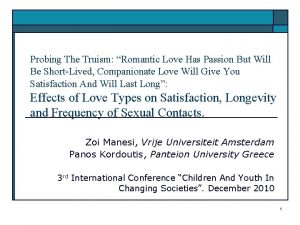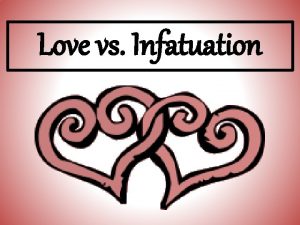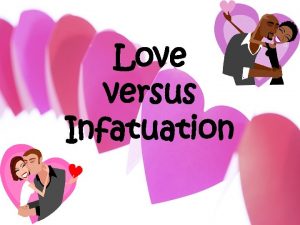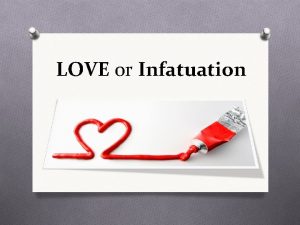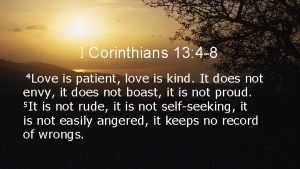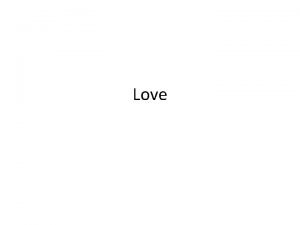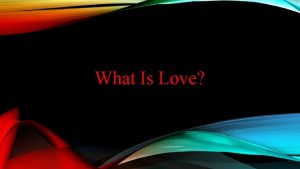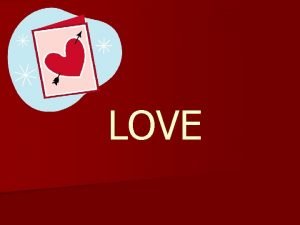Love in a Life Life in a Love









- Slides: 9

Love in a Life / Life in a Love What do we know about these poems? What do the titles tell us?

"LOVE IN A LIFE" represents the lover as inhabiting the same house with his unseen love; and pursuing her in it ceaselessly from room to room, always catching the flutter of her retreating presence, always sure that the next moment he will overtake her. "LIFE IN A LOVE" might be the utterance of the same person, when he has grasped the fact that the loved one is determined to elude him. She may baffle his pursuit, but he will never desist from it, though it absorb his whole life.

Context “In this House of Life, where I go, you go – where I ascend you run before, - where I descend, it is after you. ” - Robert Browning to Elizabeth Barrett http: //www. bbc. co. uk/learningzone/clips/sonnet-43 -how-do-i-love-thee/11533. html

I Room after room, I hunt the house through We inhabit together. Heart, fear nothing, for, heart, thou shalt find her— Next time, herself!—not the trouble behind her Left in the curtain, the couch's perfume! As she brushed it, the cornice-wreath blossomed anew: Yon looking-glass gleamed at the wave of her feather. II Yet the day wears, And door succeeds door; I try the fresh fortune— Range the wide house from the wing to the centre. Still the same chance! she goes out as I enter. Spend my whole day in the quest, —who cares? But 'tis twilight, you see, —with such suites to explore, Such closets to search, such alcoves to importune! http: //www. bbc. co. uk/learningzone/clips/robert-browning-love-in-a-life-poem-only/8116. html 5 10 15 Ask (someone) pressingly and persistently for or to do something: "I should importune him with my questions".

1. Failure 2. Hunting term used to describe the situation when the pursuing hounds lose the scent of their prey Escape me? Never— Unwilling; reluctant Beloved! While I am I, and you are you, So long as the world contains us both, 5 Me the loving and you the loth, While the one eludes, must the other pursue. My life is a fault at last, I fear: It seems too much like a fate, indeed! Though I do my best I shall scarce succeed. 10 But what if I fail of my purpose here? It is but to keep the nerves at strain, To dry one's eyes and laugh at a fall, And, baffled, get up and begin again, — So the chase takes up one's life, that's all. 15 While, look but once from your farthest bound At me so deep in the dust and dark, No sooner the old hope goes to ground Than a new one, straight to the self-same mark, I shape me— 20 Ever Removed!

Language - Comparison Different tones in each poem due to language used to describe the search for love: Love in a Life: ‘range’ ‘explore’ (tentative) Life in a Love: ‘pursue’ ‘chase’ (dynamic)

Imagery ‘Love’ is set in a domestic setting (“house”) vs the “world” of ‘Life’. In ‘Love’ the woman is described as bird-like and teasing: “wave of feather” (8) house has “wing” (12) In ‘Life’, she is fixed as the “loth” (6), the unwilling.

Form • Dramatic monologues – are they the same speaker? • The same situation from a different viewpoint? • ‘Love’ is split into two numbered stanzas – indicating the speaker’s move from despondency to hope. ‘Life’ is in one stanza, but the closing lines answer the opening lines as a sort of echo and spur to move the speaker on. How do you think the layout of the poems reflect the different attitudes of the speakers?

Structure • Complicated rhyme schemes in both, which reflect the nature of their search. • ‘Love’ = disjointed meter (switches between iambic and trochaic). Rhymes are spread out (abcddabc). • ‘Life’ = concentric rhymes (abba) before progressing to alternate lines. Largely uses iambic tetrameter. . . there is a constant sense of pace. ‘Love’ lacks the rigour and vigour of ‘Life’. It is more disjointed. Why do you think this is?
 Love love jesus is love god greatest gift lyrics
Love love jesus is love god greatest gift lyrics The salvation of man is through love and in love
The salvation of man is through love and in love That you must love me and love my dog summary
That you must love me and love my dog summary Passionate love vs companionate love
Passionate love vs companionate love Passionate love vs companionate love
Passionate love vs companionate love Love versus in love
Love versus in love Infatuated love
Infatuated love In love vs love
In love vs love Love is patient love is blind
Love is patient love is blind Consummate love vs companionate love
Consummate love vs companionate love




